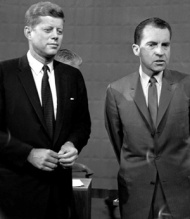Fifty-seven years ago tonight, John F. Kennedy and Richard M. Nixon met in the first-ever televised debate between major party presidential candidates.

Not everyone thought he looked awful: Nixon debating, 1960
(AP photo)
Soon enough, a hardy media myth grew up around the 1960 debate: It’s a robust trope that says radio listeners thought Nixon won while television viewers favored Kennedy.
Politico is the latest media outlet to give expression to the myth (or at least to its juiciest half).
An essay posted today declares that “most people who heard the debate on the radio, which focused on domestic issues, thought Nixon had won. But Nixon’s sickly image counted for more; most viewers focused on what they saw and not on what they heard.”
What’s remarkable about this hoary media myth is that it persists despite its thorough dismantling 30 years ago by David Vancil and Sue D. Pendell.
They noted in a journal article that evidence for viewer-listener disagreement is thin, flawed, and anecdotal. Moreover, no public opinion surveys conducted in the immediate aftermath of the debate were aimed specifically at gauging reactions radio audiences.


[…] No, ‘Politico’ — Viewer-listener disagreement is a myth of the JFK-Nixon debate […]
[…] myth of viewer-listener disagreement was thoroughly and impressively demolished 33 years ago and yet it lives on; it lives on at the New […]
[…] notion of viewer-listener disagreement was impressively demolished 33 years ago, by scholars David Vancil and Sue D. Pendell. Their […]
[…] 2. Speaking of disinformation that sticks, blogger Joseph Campbell does a nice job debunking the story now accepted as fact that Nixon’s appearance in the first televised TV Presidential candidate’s debate led to his defeat. This appears to be almost entirely a hindsight bias explanation that doesn’t comport with contemporary reports, but again, never mind: that’s what’s in the books. His analysis is here. […]